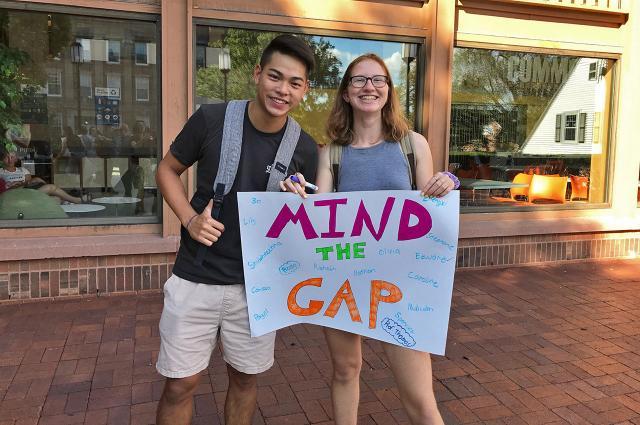Mind the Gap: Transportation in Media and Society

Rosa Stern Pait (right) pictured with a first-year student. Photograph by Amy Goldstein.
Rosa's interest in public transportation largely comes from growing up on the Green Line just outside of Boston. Rosa, a junior majoring in International Literary and Visual Studies, describes how important it was to them to "explore and travel...in the most ethical way possible...in terms of supporting city infrastructure, coming into contact with fellow citizens, and making the minimum environmental impact."
In Mind the Gap, Rosa encourages students who come from a variety of backgrounds and experiences with public transportation to challenge their assumptions about what it means to take public transportation. They recognize that many people might come to Tufts without much knowledge about the T, and might worry that it's dirty, unsafe, or just plain inconvenient. To show first-year students how exciting it can be to have the whole city accessible to them, Rosa takes them on field trips and teaches them to navigate Boston for themselves. "Recently, we visited Fields Corner, which is accessible by the Red Line," said Rosa. "We read short stories out loud and had a discussion about identity and safety in public spaces... stopping for boba in Dorchester was a huge plus." While on the T, students can explore and understand how they perceive themselves in and interact with public spaces, deconstructing how urban planning affects their sense of belonging.
Additionally, the class will look at various media depictions of public transportation to reflect on why students might have the assumptions and perspectives that they do. For example, they watched Taxi, a 2015 Iranian docufiction filmed while director Jafar Panahi was banned from making movies because of his politically subversive message. In the film, Panahi drove a taxi around Tehran and picked up passengers, actors playing versions of themselves, to get a feel for the city and the political moment. Students paired this with the Pitbull song El Taxi, where the artist uses double entendres to get racy content past Cuban radio censorship, and discussed how both the song and the movie use the space of the taxi to subvert governmental control.
Rosa's role as a peer mentor began when they were a first-year student in an Explorations seminar. They recall that the class "introduced me to the 'college' way of thinking, gave me peer role models, and introduced me to one of my closest friends." Rosa loves being a mentor and hopes they can provide the same support and community to their first-years.
About the Author:
Zoe Leaf is a senior from New York City studying Child Study & Human Development and Food Systems & Nutrition. On campus, aside from working at the Ex College, she does research at the Child Health Equity lab, is a Co-Chair of the DREAM mentorship program, and is a leader with Peer Health Exchange and with FOCUS. When she's not running around campus, she can be found reading novels, watching Mad Men, and taking care of her many plants.